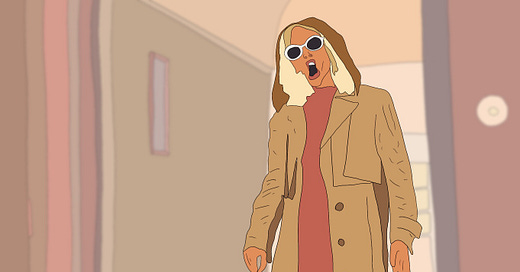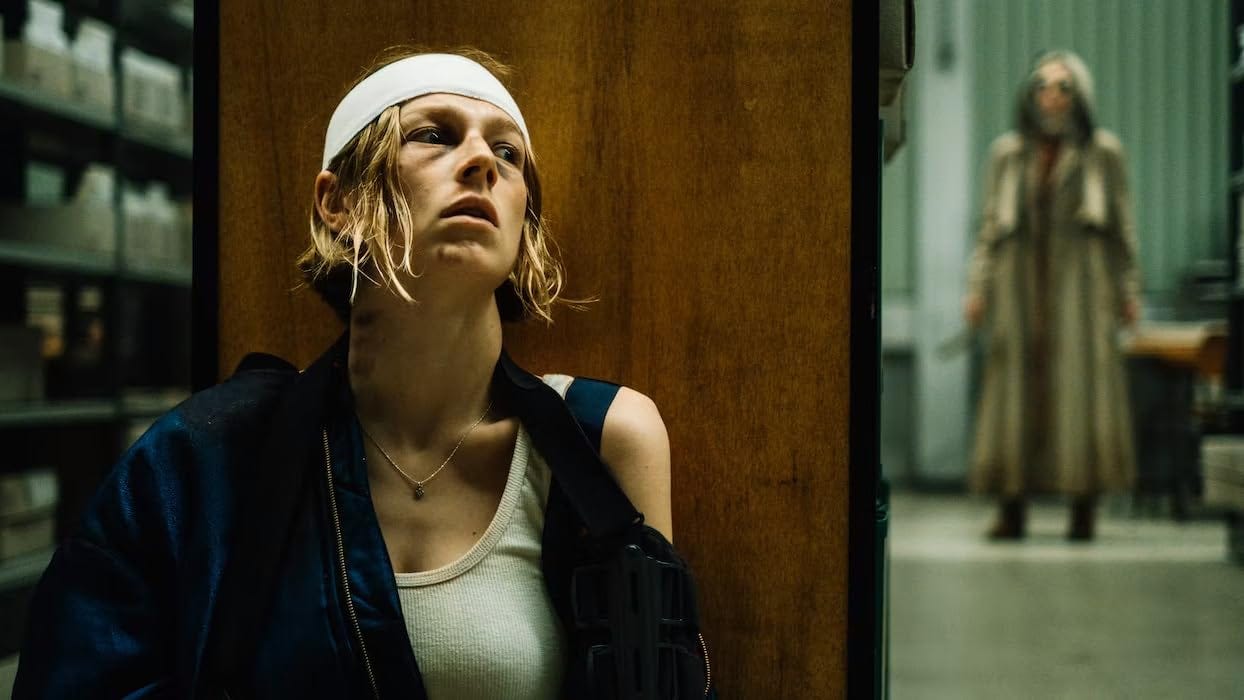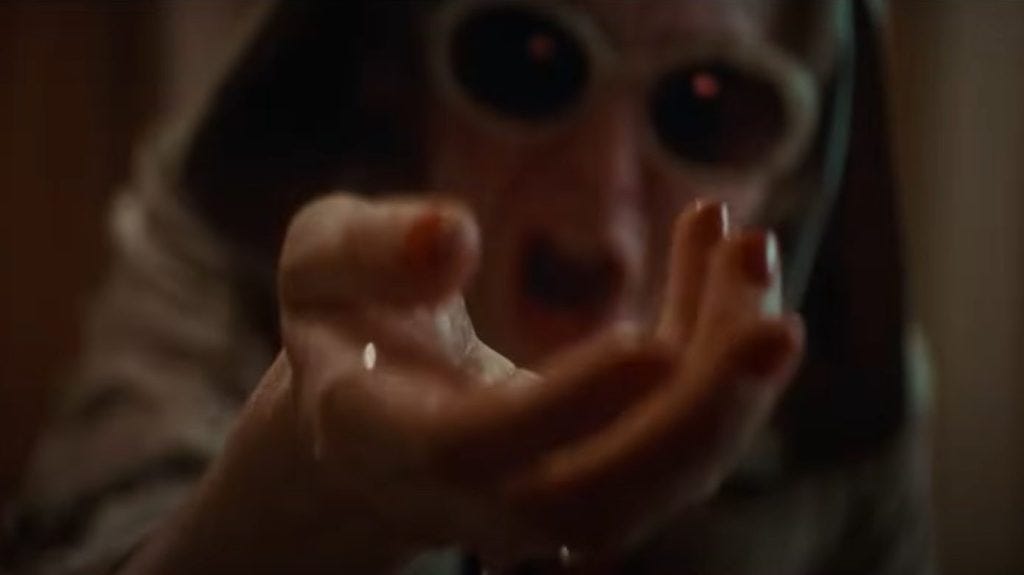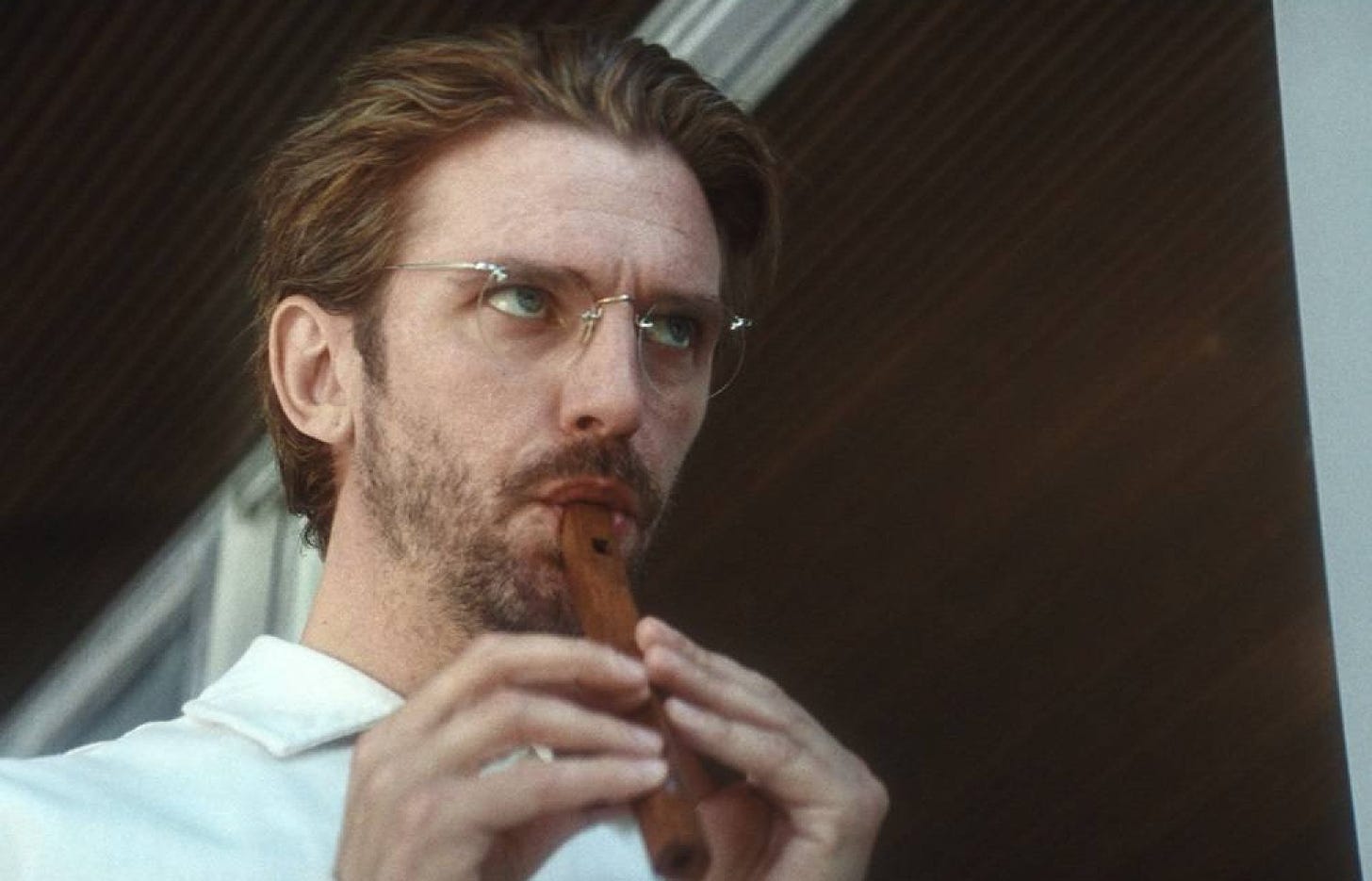Review: That was a Very F-ing Weird Way to Put It!
The many metaphors of Tilman Singer’s ‘Cuckoo’
The Yearning Rating: ✰✰✰
Romance: ✰✰
Sex: ✰
Storytelling: ✰✰
Performance: ✰✰✰✰
Yearning: ✰✰✰✰✰
Finally! One of us made it to the theater to see Cuckoo! Surely that deserves a like :)
Light spoilers ahead.
Written by Ali Romig
Is it just me, or are horror films particularly obsessed with the concept of motherhood? Rosemary’s Baby, Hereditary, Carrie…not to mention THE mother of all mother films, Ma. The list goes on. Should we be concerned that motherhood is so closely equated to chill-inducing, body-wrecking fear? Maybe not. After all, the idea of another person occupying your body and fundamentally changing you from the inside is pretty creepy—in a cute, heartwarming kind of way. That’s why I was barely surprised when, about halfway through Cuckoo, I realized the whole shrieking, bloodied mess of a film was really a story about motherhood, wrapped in a bird’s nest, inside of a cheap blonde wig.
Cuckoo follows Gretchen (Hunter Schafer), who, after the death of her mother, is forced to move from the States to a resort in the Bavarian Alps with her remarried father, Luis (Marton Csokas). She very obviously resents his new family, which includes her mostly-absent stepmom, Beth (Jessica Henwick) and electively mute younger stepsister, Alma (Mila Lieu). The resort is run by the eccentric Herr König (Dan Stevens), a self-proclaimed “preservationist” whose wardrobe consists of an endless supply of linen sets—and a wooden recorder always visible in his front pocket. He reveals to Gretchen early on his passion for the cuckoo bird—a brood parasite known for laying their eggs in other birds’ nests and letting them raise their offspring. When König begins to take an unnerving interest in Alma, Gretchen immediately understands that not everything is as idyllic at the resort as it seems, and the strange blonde woman she’s seen roaming the grounds at night is part of a larger, darker, and much more convoluted danger.
Tilman Singer’s contribution to the horror-of-motherhood lexicon can be succinctly described as off-center. Which isn’t meant as a dig! The movie is a ton of fun, even if it doesn’t always make sense. Singer throws a lot of ideas at the wall—and some, but not all, stick. Even its aesthetic feels like an amalgamation of influences. The resort gave me Overlook Hotel vibes, an unexpected bird theme was downright Hitchcockian, and the picturesque, brightly lit scenes brought to mind memories of Midsommar. Cuckoo is very obviously in conversation with the horror canon. Still, this is not an arthouse film. I left with the distinct impression that the movie prioritized interesting visuals over substance—certain stylistic choices felt like they didn’t quite fit narratively. But does that always matter? Singer is known for toeing the line between gimmick and high art. What’s campier than a silly premise delivered with a deceptively straight face?
One of the things that Cuckoo does effectively is use sound to bolster the overall sense of unease. I feel like when it comes to establishing tension, sound design is paramount. The sudden quiet; an eerie, building melody; a too-loud breath released at the wrong moment. These are all horror movie staples, but Cuckoo goes even further. Or maybe it’s just louder? Sitting through this movie was like sitting through a 100-minute attack on my eardrums. It dispatches a horrible squawking shriek with such regularity, that by the end the sound has burrowed itself into your brain. This might sound like a bug, rather than a feature, but there’s something to be said about a movie called Cuckoo becoming synonymous with an unexpectedly earth shattering caw. It’s kind of brilliant, in a very stupid way!
Now, I can’t get too far into my review without talking about Hunter Schafer. I have on many occasions in the past declared Schafer my personal dream girl, so I may be (read: am definitely) biased, but she leads Cuckoo with a captivating, vibrating surety. There were certainly notes of Jules in her portrayal of Gretchen as a surly, angsty teen, but for the most part, this character felt like a clear departure from the suburban fever dream that is Euphoria. Here, Shafer’s strength and tenacity are on full display, and she makes a great case for why she should be helming more features in the future. Supporting Shafer is a very solid cast, even if a lot of them tend to fall into the background rather quickly. The one exception is Dan Stevens as Herr König, whose performance is so delightfully deranged it quickly became my favorite of the film. At one point, he pulls his wooden recorder out and begins to play it with such an unearned nonchalance that I couldn’t help but respect the ridiculousness of it all.
At the risk of giving too much away, I’ll reveal that the crux of the horror in Cuckoo is the idea of childbearing as a parasitic ritual. I’m so tempted to say there is a queer reading ripe for mining in this, but I’d almost feel silly taking the movie that seriously. Sure, there is certainly something queer about rejecting the prescriptive notion that all women are bred for future motherhood, but is that really what Cuckoo is trying to say? Is it trying to say anything? Or is it simply inviting viewers to have a good time? I tend to think the latter is more likely. So maybe you won’t exit the movie theater with a new understanding of the moral complexities of procreation, but you will get to see Hunter Schafer make out with a random Parisian girl named Ed who just so happens to wander into the resort! And hey, that’s gay enough for me.









